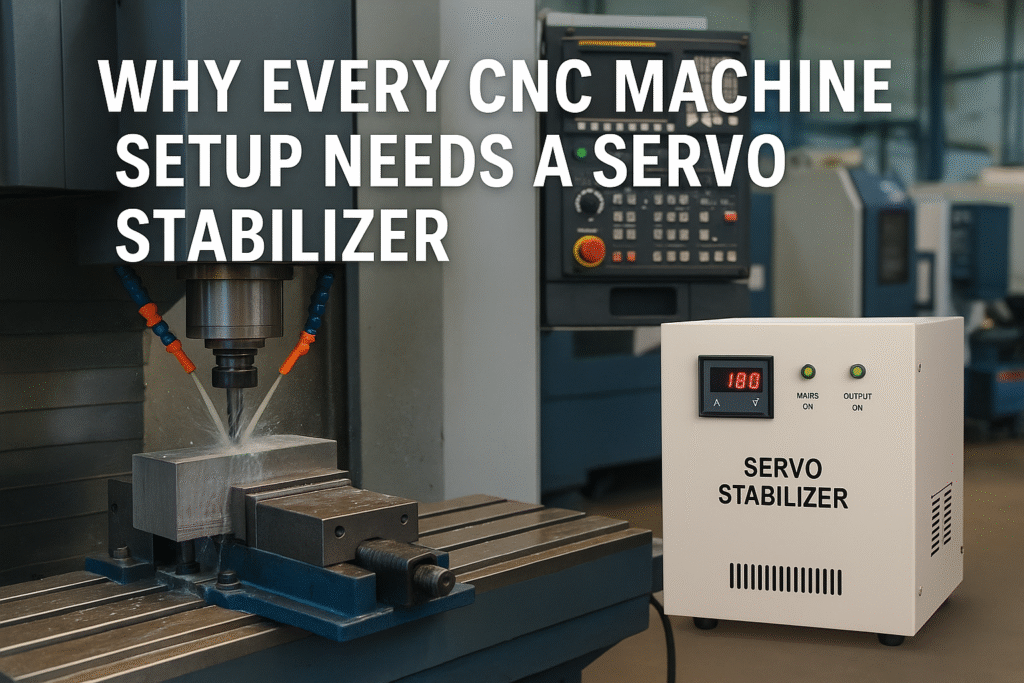
In today’s precision-driven manufacturing industry, CNC (Computer Numerical Control) machines play a pivotal role in delivering accurate and consistent output. These machines, however, are highly sensitive to electrical fluctuations. Voltage instability can affect their performance, cause breakdowns, and even damage internal components. This is where a servo stabilizer becomes an essential investment. A servo stabilizer for CNC machine operations ensures consistent voltage supply, protecting your equipment and maintaining uninterrupted productivity.
In this blog, we’ll explore why a servo stabilizer is not just beneficial but critical for CNC machine setups.
Understanding CNC Machines and Their Electrical Needs
CNC machines are used across various industries — from automotive and aerospace to furniture and electronics. These machines rely on microcontrollers and precision motors to execute complex operations. Because of their advanced electronics and high-speed movements, CNC machines are extremely vulnerable to voltage fluctuations, surges, or low-voltage conditions.
A single instance of voltage instability can lead to:
- Machine downtime
- Reduced accuracy
- Component failures
- Increased maintenance costs
- Production delays
To safeguard these expensive machines, an efficient voltage regulation solution like a servo stabilizer is a must.
What Is a Servo Stabilizer?
A servo stabilizer is an advanced voltage regulation device that ensures a consistent and controlled voltage output, regardless of the input fluctuations from the main supply. It works using a servo motor mechanism that adjusts the voltage with high precision, keeping it within a predefined safe range.
Unlike traditional stabilizers, servo stabilizers are faster, more accurate, and suitable for heavy-duty applications — making them ideal for industrial-grade equipment like CNC machines.
Why Choose a Servo Stabilizer for CNC Machine Operations?
1. Precise Voltage Regulation
CNC machines demand a stable voltage range (usually within ±1%). Even minor fluctuations can throw off the calibration of motors and affect performance. A servo stabilizer delivers highly accurate voltage correction, ensuring your CNC equipment operates smoothly and safely.
2. Protects Sensitive Electronics
CNC machines contain sensors, drivers, programmable controllers, and stepper motors — all of which are sensitive to erratic power. The servo stabilizer acts as a shield, protecting these components from surges and dips, thereby increasing their lifespan and reducing maintenance costs.
3. Reduces Downtime
Unexpected shutdowns due to voltage instability not only affect the machine but also halt production. With a servo stabilizer for CNC machine, you ensure that voltage-related interruptions are minimized, keeping your operations consistent and reliable.
4. Cost-Efficiency in the Long Run
Although servo stabilizers come with a higher upfront cost compared to standard stabilizers, they offer a much greater return on investment. By protecting CNC machinery, minimizing wear and tear, and reducing energy consumption, servo stabilizers lower overall operational costs.
5. Handles Wide Input Voltage Ranges
In many industrial areas, the voltage supply can be unpredictable and vary significantly. Servo stabilizers are designed to handle wide input voltage ranges (like 170V–270V or more), making them versatile for varied geographic locations and power conditions.
6. Low Maintenance and High Durability
Servo stabilizers are built with industrial-grade materials and high-precision components. They require minimal maintenance and can operate efficiently for years, even in demanding environments.
When and Where Should You Install a Servo Stabilizer?
Ideally, a servo stabilizer for CNC machine should be installed at the point where the machine draws power from the main supply. Whether you are setting up a new CNC workshop or upgrading an existing one, including a servo stabilizer in your electrical plan is highly recommended.
In areas prone to frequent power fluctuations or voltage drops, the role of a servo stabilizer becomes even more crucial. Manufacturers in rural industrial zones or places with inconsistent electricity supply must consider this a mandatory addition to their CNC setups.
Conclusion
For any business relying on CNC machinery, installing a servo stabilizer is not a luxury—it’s a necessity. It acts as a vital line of defense against voltage fluctuations, preserving machine accuracy, preventing costly repairs, and ensuring uninterrupted productivity. Given the high cost and complexity of CNC equipment, this small investment can save lakhs in potential damage and downtime.
So, if you’re planning to install or upgrade a CNC setup, make sure a servo stabilizer for CNC machine tops your checklist. It’s the smartest way to secure your technology, improve performance, and maintain consistent output — all while protecting your bottom line.



